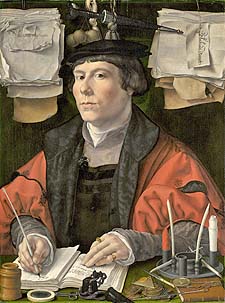
History of the Legion of Scriveners for Reform

The Legion of Scriveners for Reform was founded by Tiffany Brannan on June 1, 2020. The LSR is a sister organization of the Pure Entertainment Preservation Society (PEPS), which Tiffany and her sister, Rebekah, founded on October 17, 2016. Both organizations are branches of the larger Clean Movie Movement. The movement’s third branch is the L. A. (Lost Art) Soprani Sisters, the Brannan sisters’ singing duo dedicated to spreading the word about the influence of the Motion Picture Production Code on Hollywood history and the importance of pure entertainment. To learn more about the Clean Movie Movement, visit the PEPS website.
Tiffany started building the Legion of Scriveners in January 2018. She got the idea for the organization in late 2017. The concept was not an original one of her own. The basic idea, as well as the title “Legion of Scriveners” comes from Joseph I. Breen, the head of the Production Code Administration (PCA) from 1934 to 1954. Mr. Breen is the great hero of the Clean Movie Movement, since his dedicated efforts at the PCA for twenty years created the most decent movies ever made. Under his leadership, the Production Code was successfully enforced for the only time in history, creating thousands of films which are acceptable for audiences of all ages. To learn more about Mr. Breen, visit PEPS. Click here to read the first detailed overview of his life that Tiffany published on PEPS.
The PCA’s inner workings have only truly been revealed in Jack Vizzard’s memoirs, See No Evil: Life Inside a Hollywood Censor from 1970. Mr. Vizzard was a PCA employee from 1944 to its dissolution in 1968. One of the younger members of the PCA, Jack Vizzard was close friends with Joseph Breen, acting as third-in-command during Mr. Breen’s tenure and second-in-command after his retirement in 1954. Although many of this book’s facts have yet to be officially researched and corroborated by other sources, it includes invaluable inside information about Joseph Breen, his assistant and successor, Geoffrey M. Shurlock, and the other men who played important roles in the success and demise of the Code.
In every chapter of this book, Jack Vizzard mentions a series of random incidents in loose chronological order. Some occurrences were pivotal for later events, others were used as examples, and still others were just interesting stories which he wanted to share. The passage which inspired the Legion of Scriveners is somewhere between an example of Joseph Breen’s nature and a random story. It is on pages 151-152 in chapter 10, “The Ingrid Bergman Affair and The Moon is Blue.”
Neither had Joe’s proclivity for sowing the seeds of sedition disappeared. He was concerned that the producers were stirring and beginning to show streaks of boldness. He knew how to cope with this, but he no longer had quite the fiery energy to launch the remedy. Therefore, he buttonholed me in private and detailed a plan he had been nurturing in secret for many years.
“What I thought to do at one time,” he said, “was to start a Legion of Scriveners. This is a cash business, you know. That means that every day lost is money at the box office that is gone forever. That’s why producers are so sensitive to complaints. They see a silver stream of dollars flowing under the bridge that are completely unrecoverable.
“You know the power of one good letter? I don’t mean a ream of signatures on a roll of Waldorf that’ve been cooked up by an Irish nun in the Midwest. They just go into the wastebasket. No. I mean a thoughtful letter from the president of a bank. Or the head of an insurance company. A dozen of those’d make more of an impression than a bushel of postcards.
“All you have to do is organize. They shouldn’t all come in at once. And… whoever was writing should see the picture. That’s a courtesy a lot of people don’t seem to think they’re obliged by. And they should be regional – not twelve from Los Angeles, you know.
“It’d be easy – there’s a lot of existing organizations. There’s the Knights of Columbus, the Holy Name Society, you name them. They have the highest type men.” He paused, cocked his head to see if I was getting the picture, and then pushed home the obvious question. “Why wouldn’t that be a good undertaking for a young man like you?”
I was giddy with visions of power. This was the type thing I was programmed to do, and do well. But there had been, perhaps, a Freudian slip in the use of one certain word. This was the term “undertaking.” I somehow vaguely felt that this was more a description of what would happen to me should I take Joe up on his proposition. Without making an issue of it, I passed.
But Joe was revealed as that marvelous combination of a pyromaniac who owned the fire department.
Tiffany didn’t think much of this passage when she first read it. However, some time later, she found herself pondering this information. According to Jack Vizzard, a Legion of Scriveners had been Mr. Breen’s idea for sustaining enforcement of the Code throughout the 1950s, since he knew he must eventually retire. She thought about what a pity it was that the Freudian connotations of the word undertaking had discouraged Mr. Vizzard from pursuing the idea. Suddenly, it occurred to her that it was not too late for Mr. Breen’s idea to be carried out. If properly organized, a Legion of Scriveners could be just as effective now as it could have been when first suggested.
Tiffany decided to call the organization the Legion of Scriveners for Reform because its purpose in this post-Code Era would not be to maintain decency through the Code but to reinstate it by replacing the Rating System with the Code. In fact, such an organization is more needed now than it was in the 1950s, when decency guidelines such as the PCA were still firmly in place.
Tiffany had long felt that there was a strong feeling in many people for the need for entertainment reforms, such as the reinstatement of the Code. She had witnessed it through conversations with acquaintances and strangers. However, she hadn’t known how to harness it. The PEPS website was currently only garnishing views, and petitions had proven unsuccessful. However, the LSR would give the Clean Movie Movement the facet it lacked, a branch dedicated to action. It would give interested people a clear way to get involved by showing them how they can help.
With this in mind, Tiffany decided to found the Legion of Scriveners for Reform as a way to harness the power of the pen to show those in charge of the media which rule our world that we demand decency and responsibility in entertainment and advertising. We hope that this organization will help us encourage people from all walks of life to influence media leaders with “a thoughtful letter,” or two or three. As Mr. Breen told Jack Vizzard, “A dozen of those’d make more of an impression than a bushel of postcards.
Please help us make that impression by becoming a scrivener! Remember the words of Joseph Breen, which are the Legion’s motto:
“You know the power of one good letter?
